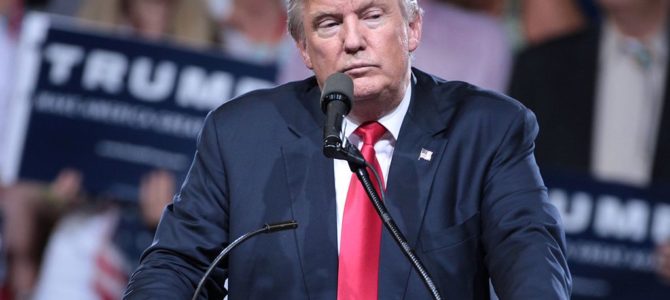
Gen. Michael Hayden, the former NSA and CIA director, has inadvertently revealed the ultimate subtext for the political establishment’s antagonism towards President Trump.
Trump has “normalized lying to an unprecedented degree,” Hayden writes in a New York Times op-ed, adding: “In this post-truth world, intelligence agencies are in the bunker with some unlikely mates: journalism, academia, the courts, law enforcement and science — all of which, like intelligence gathering, are evidence-based. Intelligence shares a broader duty with these other truth-tellers to preserve the commitment and ability of our society to base important decisions on our best judgment of what constitutes objective reality.”
There’s some irony there, given how intelligence agencies have used journalists and academics to advance their agendas. But we’ll set that aside. While professionals in these fields should base their work in careful and dispassionate analysis of facts, logic and evidence, they’ll encounter two problems. First, rising within many of these institutions requires political acumen in at least equal proportion to merit. Second, progressives dominate in most of these fields – if you do not conform you are unlikely to survive.
Those who exhibit intellectual honesty and follow truth wherever it leads them, even when it flies in the face of the views of their superiors, are frequently punished. This is especially so if the relevant work is deemed detrimental to the aims of the bureaucracies in which they serve. Increasingly of course, we see all of these areas politicized in myriad ways. These same rules apply in politics as politics.
It is notable that Hayden’s essay, compelled by his view that the president has made intelligence nearly impossible due to his alleged affinity for untruth, begins with an allusion to his arriving in Bosnia during its civil war in the ‘90s and marveling at how the country could devolve into chaos and tyranny. Hayden implies that the fine line between once-thriving Bosnia and America is small, especially given the current stress on our institutions.
If truth is the differentiator, how ironic that Hayden and much of the national security and foreign policy establishment never once expressed such concerns when former Secretary of State Hillary Clinton lied about her own visit to Bosnia. Recall that Clinton, in attempting to portray herself as courageous, falsely claimed she had landed there “under sniper fire” in 1996.
Similarly, the establishment expressed little to no concern over the lying and dissembling of Clinton and the colleagues with whom she coordinated in the days following the Sept. 11, 2012 Benghazi attack; or horror at the following of this dishonesty to its logical inclusion by promising the administration would jail a filmmaker for a movie that she knew had nothing to do with it.
What of Clinton’s boss? If truth was the differentiator, how could any of the members of the establishment in good faith have served a president in Barack Obama who clung to the false narrative that al-Qaeda was “on the run” when those in the know, such as the head of the Defense Intelligence Agency, said it was not, and the documents collected from Osama bin Laden’s Abbottabad compound confirmed it? What of the fact that the Iran Deal was admittedly sold dishonestly to the public by manipulating the press? How could said establishment have ever stood by a president whose chief domestic policy was built around a lie: “If you like your plan you can keep your plan?”
One need not recount President Bill Clinton’s record to question how the national security and foreign policy establishment could have happily and willingly served such a “post-truth” figure. As for the establishment’s view of Republican presidents, presumably Hayden et al would argue both Bush the elder and younger fit firmly within the bounds of accepted rhetoric, policy and refinement.
Now consider what Hayden tells us a bit later on in his piece: “When asked for counsel these days by officers who are already in government, especially more junior ones, I remind them of their duty to help the president succeed. But then I add: ‘Protect yourself. Take notes and save them. And above all, protect the institution. America still needs it.'” [Emphasis mine]
Hayden and the establishment’s contempt for Trump is not chiefly partisan, and it’s likely not about honesty either. Rather, what really makes Trump fundamentally different for the national security and foreign policy establishment is that he unabashedly attacked it over not only the prevailing progressive narratives to which its leaders cling, but one, single, highly inconvenient truth: Under establishment leadership the world has gotten progressively more dangerous and volatile, particularly under the Obama-Clinton administration.
It is embarrassing for a president to call you a failure and attack your institutions, while placing the blame for what has occurred at your feet. For the president to embrace and ultimately appoint as national security advisor someone who you view as a traitor to your class, Lt. Gen. Michael Flynn, might understandably leave those in the establishment upset.
This explains in part the apparent double standard applied to Flynn versus former Director of National Intelligence James Clapper — not to mention the manner and swiftness with which Flynn was taken out.
The broader questions raised here are also disturbing. Do federal employees pledge allegiance to the bureaucracies under which they serve, or to the Constitution? What kind of precedent does dedication to institution over all else set?
It is hard not to read this statement as condoning the undermining and subversion of a president for the good of the “institution.” It is hard not to read this statement as justifying the supplanting of the judgment of the American people by way of their duly elected commander-in-chief with the wisdom of the president’s subordinates. The prioritizing of institution above all else is far more detrimental to the integrity of our system than an anti-progressive, anti-establishment president.
If you cannot faithfully serve your commander-in-chief, you have an obligation to step down. If what a president is doing is really so far beyond the pale — and not just in conflict with your worldview and thereby a challenge to the power and influence of your institutions — there are remedies within the law to counter him. Checks and balances exist for a reason. Going outside this system poses a grave danger to our constitutional order.
The telltale sign that the establishment is unwilling to grapple with a president it loathes in an ethical manner is its willingness to resort to game-playing with redactions, stonewalling over documents, endlessly leaking on the most sacrosanct of matters, engaging in limitless investigations against institutional rules and procedures marked by brazen and heavy-handed tactics, and refusing presidential orders outright.
Bureaucracies end up existing primarily to perpetuate themselves and protect and preserve the power of their principals. This does not make it any less devastating to see our political class openly admitting it prioritizes its institutions above all else. Trump’s greatest success as president may be the incidental exposure of this sad and dangerous reality, because those so threatened by him substantively and those appalled stylistically simply cannot seem to restrain themselves.









